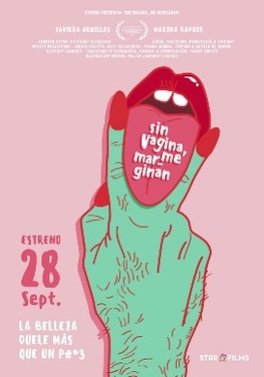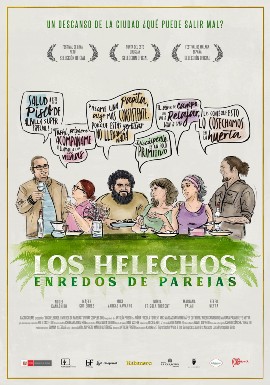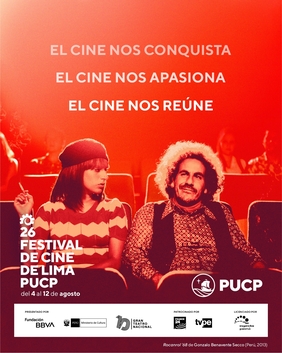The festival
The first festival was first held in 1997 under the name "Elcine Festival" at the PUCP Cultural Center in San Isidro District Lima, which continues to host the main festival. Conceived as a "Latin American Meeting of Cinema" the growth of the festival has expanded to the Centro Cultural de la PUCP, brought in Cineplanet, and various concert halls and cultural centers in Lima.
The festival is held annually in the first half of August. Being the main film event in Peru and one of the most important events in Lima's cultural calendar it is a noted festival for regional cinema in Latin America. The Festival launches & promotes the work of Peruvian directors, such as Claudia Llosa and Josué Méndez, and seeks to increase distribution of Latin American films in Peru and elsewhere. In addition to the films in competition, the festival includes screenings of international films, tributes to figures in the film industry, and other cultural activities such as master classes, lectures and art exhibitions.

Andrés Wood Montt is a Chilean film director, producer and writer. Some of his most popular films include Machuca, Violeta se fue a los cielos, and Historias de Futbol. He created his own production company known as Wood Producciones in 1993.
Video de familia is an independent Cuban film made in 2001. It tells the story of a broken Cuban family with a homosexual son which has emigrated to the US. The film is composed of 5 shots of 10 minutes each, in the form of Video Letters. The film has won a number of awards in Cuba.

While the Peruvian film industry has not been nearly as prolific as that of some other Latin American countries, such as Mexico or Argentina, some Peruvian movies produced enjoyed regional success. Historically, the cinema of Peru began in Iquitos in 1932 by Antonio Wong Rengifo because of the rubber boom and the intense arrival of foreigners with technology to the city, and thus continued an extensive, unique filmography, with a different style than the films made in the capital, Lima.

Rodrigo Moreno is an Argentine film director and screenplay writer. He works mainly in the cinema of Argentina.

The Havana Film Festival is a Cuban festival that focuses on the promotion of Latin American filmmakers. It is also known in Spanish as Festival Internacional del Nuevo Cine Latinoamericano de La Habana, and in English as International Festival of New Latin American Cinema of Havana. It takes place every year during December in the city of Havana, Cuba.

Pavel Giroud is a Cuban film director based in Madrid, Spain.

Chilean cinema refers to all films produced in Chile or made by Chileans. It had its origins at the start of the 20th century with the first Chilean film screening in 1902 and the first Chilean feature film appearing in 1910. The oldest surviving feature is El Húsar de la Muerte (1925), and the last silent film was Patrullas de Avanzada (1931). The Chilean film industry struggled in the late 1940s and in the 1950s, despite some box-office successes such as El Diamante de Maharajá. The 1960s saw the development of the "New Chilean Cinema", with films like Three Sad Tigers (1968), Jackal of Nahueltoro (1969) and Valparaíso mi amor (1969). After the 1973 military coup, film production was low, with many filmmakers working in exile. It increased after the end of the Pinochet regime in 1989, with occasional critical and/or popular successes such as Johnny cien pesos (1993), Historias de Fútbol (1997) and Gringuito (1998).
Marco Antonio Mazzini is a Peruvian clarinetist.
The cinema of Iquitos, also known as Amazonian cinema, is an important film development and one of the historic pioneering event of cinema of Peru. Due to the rubber boom and the arrival of foreigners, film interest began in the early 20th century, along with the evolution of cinema of the United States in Hollywood. Cinema in Iquitos had no established date of origin. The first film, however, was made in 1900. The first films were shown in the Casa de Fierro with an Edison machine, which reproduced the images using a carbide lamp and the constant movement of the operator. Iquitos is mentioned as a metonym of cinema in the Peruvian Amazon.

The Latin American Film Festival (LAFF) was a film festival dedicated to Latin American cinema, held annually in the city of Utrecht, Netherlands, from 2005 to 2013.

The Margarita Latin American and Caribbean Film Festival, sometimes known as FilMar,:107 is an important international cultural event dedicated to generating spaces for the distribution and promotion of the best of Venezuelan, Latin American, and Caribbean film.
The Havana Film Festival New York (HFFNY) is a film festival, based in New York City, that screens cinema from across Latin America with a special focus on Cuba and its film industry. It is a project of The American Friends of the Ludwig Foundation of Cuba, a 501(c)(3) tax-exempt organization with the mission of building cultural bridges between the United States and Cuba through arts projects.

Samichay, In Search of Happiness is a 2020 Peruvian black-and-white drama film written and directed by Mauricio Franco Tosso, spoken in Cuzco Quechua and premiered at the Lima Film Festival, about the journey of a peasant quechua with his cow called Samichay in the Andes of Peru. It was awarded at film festivals in Peru, Spain and Chile. The film had its commercial premiere in Peruvian theaters on August 4, 2022.

Javier's Passion is a 2019 Peruvian biographical drama film directed by Eduardo Guillot and written by Guillot, Enrique Moncloa & Augusto Cabada. The film tells the story of the poet Javier Heraud, his university life and his tragic death. It premiered on September 26, 2019, in Peruvian theaters.

Sin vagina, me marginan is a 2017 Peruvian comedy-drama film written, directed and produced by Wesley Verástegui in his directorial debut. The film stars the model Javiera Arnillas and the singer Marina Kapoor, being the first Peruvian film in the history of this country that has transsexual people as its main characters.

What Couples Do is a 2018 Peruvian comedy-drama film directed by Antolín Prieto and written by Prieto & Fernanda Gutiérrez. The film uses the improvisation technique commonly seen in the theater, making it the first Peruvian film to use it. It stars Nuria Frigola Torrent, Miguel Vargas, Pedro Kanashiro, Fernanda Gutierrez, Fernando Neyra, Mariana Palau and Pold Gastello.

El viaje macho is a 2016 Peruvian drama road movie written, produced, and directed by Luis Basurto in his directorial debut. It stars Luis Ramírez. It is about 2 ex-prisoners who embark on a journey in search of the last freedom by getting on the "male train".

The 27th Lima Film Festival, organized by the Pontifical Catholic University of Peru, will run 10–18 August 2023 in Lima, Peru.

The 26th Lima Film Festival, organized by the Pontifical Catholic University of Peru, took place from 4 to 12 August 2022 in Lima, Peru. The awards were announced on 12 August 2022, with Dusk Stone winning the Trophy Spondylus.















